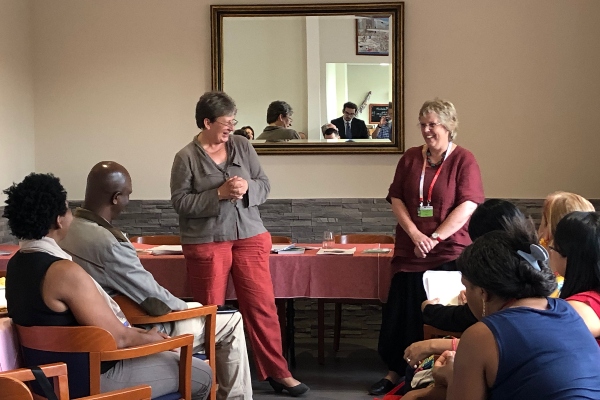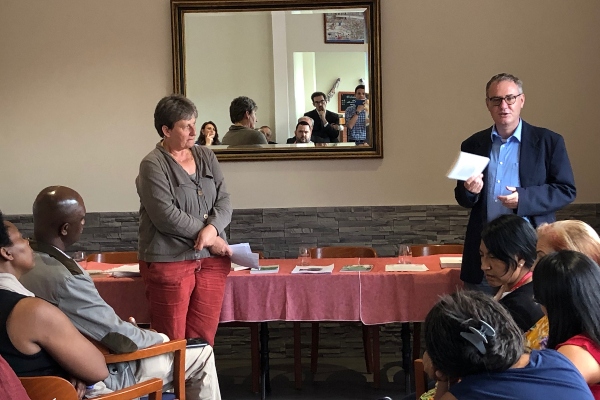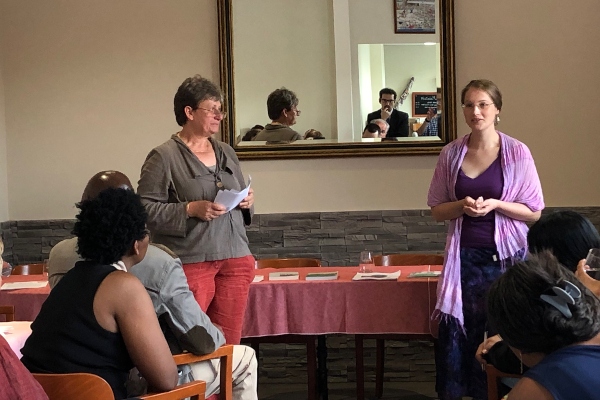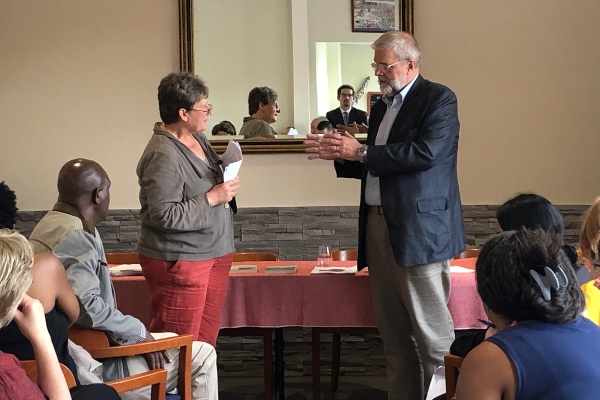Conociendo a los autores – Un diálogo y encuentro junto a expertos en asuntos laborales (12 Julio 2019, Ginebra)

Traducir:
Meet the Authors’ – Talk and reception with Experts of Labour Affairs
On June 19th in Geneva, Switzerland, various authors focused on the future of work met during the occasion of the Centenary celebration of the International Labour Organization (ILO). This gathering, consisting of representatives from the Holy See, Aggiornameni Sociali (AS), the Women in Informal Employment: Globalizing and Organizing (WIEGO), the International Young Christian Workers (IYCW) movement, and OBSFIN, as well as various partnered and allied organizations to help celebrate the progress made in achieving these publications and to encourage future dialogue.
The reception was opened by H.E. Archbishop Ivan Jurković Apostolic Nuncio, Permanent Observer of the Holy See to the United Nations, who welcomed and thanked all the participants for their contributions and hard work, highlighting that some of the authors were also involved in the publication of Rethinking Labour: Ethical Reflections on the Future of Work published by Caritas in Veritate Foundation (CiVF) all those gathered.
A copy of which can be downloaded here:
After his opening remarks, Dr. Hildegard Hagemann from the Deutsche Kommission Justitia et Pax who was the moderator of the session, asked each author to briefly introduce themselves and their publications. Many of the authors are members of “The Future of Work, Labour after Laudato Si” global project.
The first author was Fr. Paolo Foglizzo the editor of AS (https://www.aggiornamentisociali.it/) who, together with Giacomo Costa, – Director of AS – wrote Il Lavoro è Dignità. In this book, Fr. Giacomo Costa and Fr. Paolo Foglizzo gather and comment on the Pope’s most significant interventions on the subject of work: we are offered an adequate framework for contemporary reality, in which to place our reflection on work and our action in favor of women and men who work. As Pope Francis himself said, «our duty is to work to make this world a better place and fight».
A copy of the book can be bought at:
https://www.ediesseonline.it/prodotto/il-lavoro-e-dignita/

The next two authors both submitted articles in: Wishes for the Future Recommendations of Experts to the ILO, released by the Deutsche Kommission Justitia et Pax.
Karin Pape, Deputy Director, and head of the Organization and Representation Programme of WIEGO network, introduced the article Informal is Normal. WIEGO (http://www.wiego.org/) consists of individuals and institutions from three broad constituencies: membership-based organizations (MBOs) of informal workers, researchers and statisticians, and practitioners from development agencies, and they seek to increase the voice, visibility and validity of the working poor, especially women. WIEGO also had a strong presence at the International Labour Conference (ILC) and had an important role in the discussion in the Standard-Setting Committee: Violence and Harassment in the World of Work and helped pass both the Convention and Recommendation concerning the elimination of violence and harassment in the world of work.
The next author, Sarah Prenger, wrote the piece 100 years of ILO – “We have to start; we are only at the beginning!”. Sarah Prenger is the international president of the IYCW organization (http://joci.org/en/) and was part of a delegation sent to the ILC to speak on the challenges that young workers are facing today.
A copy of both articles, along with the rest of the Journal, can be found at:
http://www.justitia-et-pax.de/jp/publikationen/pdf/guf_136.pdf

Finally, the last author Professor Paul H. Dembinski from the University of Fribourg and Director of OBSFIN (http://www.obsfin.ch/) released The Church and Labour – Work in Progress, an article in the Journal Rethinking Labour and the Future of Work, an Interreligious Perspective. He spoke about the role of the church in facing the upcoming challenges in facing the world of work and about “A proposal to extend the Decent Work Agenda and address the current global crisis” written by various partners of “The Future of Work, Labour after Laudato Si” global project:
A copy of the declaration can be found at:

After the introductions there was a space for a questions and answers session followed by a reception in which the participants had the opportunity to discuss their ideas, future activities, and network. This was done in the hopes of encouraging future dialogue from different perspectives on the complex and challenging issues facing the future of the world of work.

